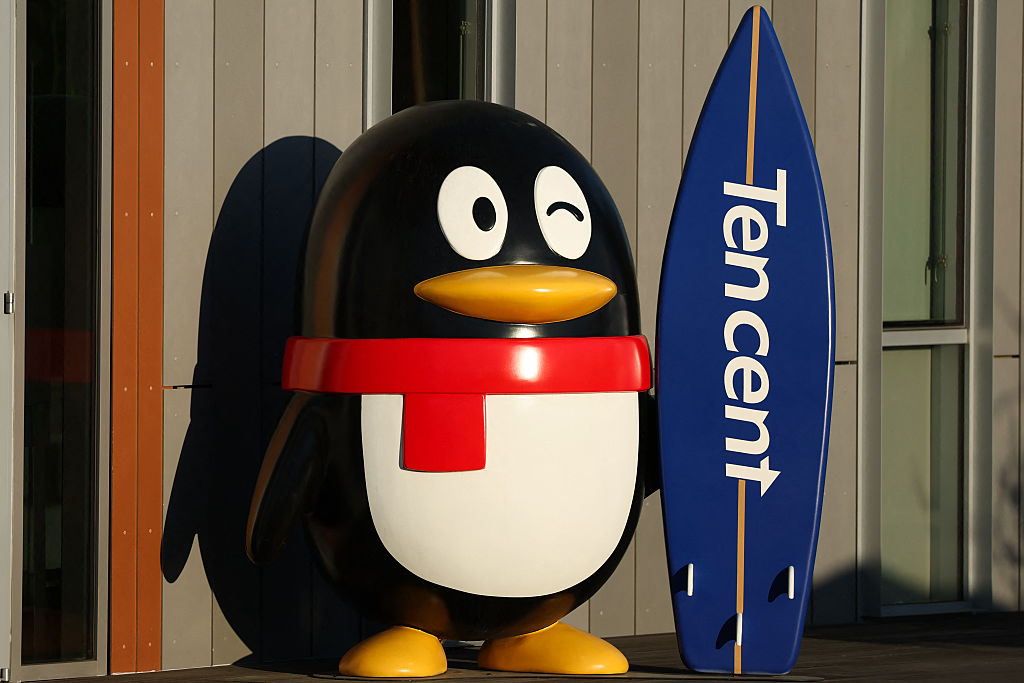AI ETFs: should you buy one?
Despite facing challenges this year including outflows from US ETFs, AI is still one of the most important investing themes. Should you buy an AI ETF?


Get the latest financial news, insights and expert analysis from our award-winning MoneyWeek team, to help you understand what really matters when it comes to your finances.
You are now subscribed
Your newsletter sign-up was successful
Want to add more newsletters?

Twice daily
MoneyWeek
Get the latest financial news, insights and expert analysis from our award-winning MoneyWeek team, to help you understand what really matters when it comes to your finances.

Four times a week
Look After My Bills
Sign up to our free money-saving newsletter, filled with the latest news and expert advice to help you find the best tips and deals for managing your bills. Start saving today!
Buying an AI exchange-traded fund (ETF) is a simple way to give yourself exposure to one of the biggest investment trends. But, with 2025 bringing fresh challenges to the US big tech firms at the forefront, is now the right time to buy an AI ETF?
Artificial intelligence (AI) has taken the world by storm since the launch of ChatGPT in November 2022. Since then, the top funds and stocks across the world have been dominated by big tech stocks like the ‘Magnificent Seven’.
With its cutting-edge AI chips underscoring this revolution, Nvidia recently became the world’s first $4 trillion company thanks to the surging importance of AI.
MoneyWeek
Subscribe to MoneyWeek today and get your first six magazine issues absolutely FREE

Sign up to Money Morning
Don't miss the latest investment and personal finances news, market analysis, plus money-saving tips with our free twice-daily newsletter
Don't miss the latest investment and personal finances news, market analysis, plus money-saving tips with our free twice-daily newsletter
But the AI boom has its detractors. US dominance of the global industry came under threat earlier this year when Chinese upstart DeepSeek rocked stock markets.
US-focused ETFs have also seen outflows this year as president Donald Trump’s tariff policy has prompted global investors to consider selling US stocks.
“US equity ETFs dropped to their lowest level in 14 months in June,” commented Alastair Baillie Strong, global head of ETFs at Fidelity International. Geopolitical events such as the US’s intervention in the Middle East was one of the main contributors towards a $1.47 billion outflow from North America-focused UCITS ETFs during the month.
But some experts believe there is plenty more to come.
“AI capabilities are advancing exponentially, yet most businesses have barely begun to exploit them,” says Rahul Bhushan, Managing Director at ARK Invest Europe. “This gap between what’s possible and what’s been implemented is creating a massive opportunity.”
Bhushan adds that AI is also getting cheaper to deploy. “History shows that once transformative tech gets cheap and ubiquitous, adoption eventually inflects upward,” he says. “We expect a wave of enterprise AI adoption in the next few years (think 2025–2027), as the current hesitancy gives way to competitive pressure.”
The challenge in tapping into this opportunity comes in picking the eventual winners. “Companies at the forefront today might not be the leaders tomorrow,” says Bhushan.
Picking an ETF that invests in AI companies spreads your bets, giving you a greater chance of holding the eventual winners in your portfolio.
What kinds of AI ETF are available?
The first decision that applies to any ETF selection process is the active versus passive debate. Actively-managed ETFs tend to charge higher fees than passive equivalents, but they offer the potential to beat the market through the judicious trades of their portfolio manager. This isn’t guaranteed to happen (and in fact, some studies show that active management tends to underperform rather than outperform), but it can potentially lead to outsize returns.
“Active managers aren't bound by an index's rules,” says Bhushan. “This allows them to focus on a high-conviction ‘best ideas’ portfolio, selecting companies they believe have the strongest potential for growth within the AI ecosystem.”
It isn’t necessarily the case that all passive ETFs are the same. The selection and rebalancing strategy of their benchmark index can make a big difference to their returns.
Index construction also impacts the extent to which an ETF can be considered a true reflection of its stated objective (in this instance, AI exposure).
“If it is too broad, you can just end up with a lot of generalist stocks and an index that is more driven by general global trends rather than AI specifically,” says Ben Seager-Scott, chief investment officer at Forvis Mazars. “Whereas, if the index rules are too narrow, you can end up with a small number of obscure names that carry a lot of concentration risk and may not ultimately be the beneficiaries of the technology.”
As a demonstration of how it can differ even between four ETFs investing in the same theme, consider these four AI ETFs:
ETF ticker | Active / passive | Fees (TER) | Price change* |
INTL | Passive | 0.4% | 6.67% |
AIAI | Passive | 0.49% | 17.3% |
AIQU | Passive | 0.4% | 25.1% |
ARKI | Active | 0.75% | 64.8% |
(*Price changes over the 12 months to 14 July 2025, except AIQU which shows returns since listing on 12 September 2024.)
Let’s have a look at the pros and cons of each ETF and explore what they potentially offer an investor’s portfolio.
1. INTL: targeted AI exposure
The WisdomTree Artificial Intelligence UCITS ETF (LON:INTL) tracks the NASDAQ CTA Artificial Intelligence Index.
This index assesses a broad universe of stocks' relevance to three categories (AI enablers, engagers and enhancers), and selects 15 companies (reviewed twice annually) from each based on the degree of their relevance. This gives its holdings a high level of relevance to the AI theme.
As of 14 July, INTL’s top three holdings are SK Hynix, Nvidia and Advanced Micro Devices – all of which are semiconductor companies key to designing and building the hardware that powers AI companies.
2. AIAI: quarterly rebalancing
The L&G Artificial Intelligence UCITS ETF (LON:AIAI) tracks the ROBO Global Artificial Intelligence Index. Like its Nasdaq counterpart, this index weights constituents based on their relevance to the AI theme.
However, it rebalances quarterly, meaning that there is twice as much buying and selling of the constituent stocks going on. Lots of investors like frequent rebalancing because it effectively automatically sells high, and buys low: assuming no change in relative AI relevance, stocks whose share prices have outperformed over the quarter will be sold, and those that have underperformed will be bought.
Though not for everyone (many investors prefer strategies that let outperformers run their course longer before taking profits), this makes AIAI an interesting option for investors that see the value in a quarterly rebalancing strategy.
3. AIQU: broad diversification
The newest of these four funds, the Global X Artificial Intelligence UCITS ETF (LON:AIQU) has outpaced INTL’s 19.4% price gains since its inception on 12 September, though it trails AIAI and ARKI’s during that time.
Its benchmark index, the Indxx Artificial Intelligence Index, uses a modified market cap-weighted approach that caps individual holdings at 3% and rebalances twice annually.
While this low cap could weigh on performance (by limiting the gains from individual outperformers), it does potentially make it appealing for investors worried about megacap concentration.
It has a very low concentration of Magnificent Seven stocks in its top holdings. At the time of writing, only Meta, Microsoft and Nvidia make its top ten, and none make its top five. Those spaces go to smaller companies like Palantir , the top holding at time of writing, and Chinese tech giant Tencent.
It therefore makes a solid choice for AI investors who want to diversify away from the main US megacaps.
4. ARKI: actively-managed AI
The ARK Artificial Intelligence & Robotics UCITS ETF (LON:ARKI) exemplifies the (often unfulfilled) promise of active management.
While the ETF only listed in April, it has already raced ahead of its three passive competitors, gaining over 60% over the last year. Investors holding the fund won’t mind an extra 35 basis points in fees when its returns are more than double that of the competition – though there is of course no guarantee that this will be the case over the long run.
With stock selection driven by ARK’s CIO and founder, Cathie Wood, investors can expect early-stage and little-known companies in this ETF, such as warehouse robotics company Symbotic, which has a market cap of just $28 billion.
Get the latest financial news, insights and expert analysis from our award-winning MoneyWeek team, to help you understand what really matters when it comes to your finances.

Dan is a financial journalist who, prior to joining MoneyWeek, spent five years writing for OPTO, an investment magazine focused on growth and technology stocks, ETFs and thematic investing.
Before becoming a writer, Dan spent six years working in talent acquisition in the tech sector, including for credit scoring start-up ClearScore where he first developed an interest in personal finance.
Dan studied Social Anthropology and Management at Sidney Sussex College and the Judge Business School, Cambridge University. Outside finance, he also enjoys travel writing, and has edited two published travel books.
-
 Should you buy an active ETF?
Should you buy an active ETF?ETFs are often mischaracterised as passive products, but they can be a convenient way to add active management to your portfolio
-
 Power up your pension before 5 April – easy ways to save before the tax year end
Power up your pension before 5 April – easy ways to save before the tax year endWith the end of the tax year looming, pension savers currently have a window to review and maximise what’s going into their retirement funds – we look at how
-
 Three key winners from the AI boom and beyond
Three key winners from the AI boom and beyondJames Harries of the Trojan Global Income Fund picks three promising stocks that transcend the hype of the AI boom
-
 'AI is the real deal – it will change our world in more ways than we can imagine'
'AI is the real deal – it will change our world in more ways than we can imagine'Interview Rob Arnott of Research Affiliates talks to Andrew Van Sickle about the AI bubble, the impact of tariffs on inflation and the outlook for gold and China
-
 Three promising emerging-market stocks to diversify your portfolio
Three promising emerging-market stocks to diversify your portfolioOpinion Omar Negyal, portfolio manager, JPMorgan Global Emerging Markets Income Trust, highlights three emerging-market stocks where he’d put his money
-
 New year, same market forecasts
New year, same market forecastsForecasts from banks and brokers are as bullish as ever this year, but there is less conviction about the US, says Cris Sholto Heaton
-
 How to profit from the UK leisure sector in 2026
How to profit from the UK leisure sector in 2026The UK leisure sector had a straitened few years but now have cash in the bank and are ready to splurge. The sector is best placed to profit
-
 Metals and AI power emerging markets
Metals and AI power emerging marketsThis year’s big emerging market winners have tended to offer exposure to one of 2025’s two winning trends – AI-focused tech and the global metals rally
-
 Quality emerging market companies with consistent returns
Quality emerging market companies with consistent returnsOpinion Mark Hammonds, portfolio manager at Guinness Global Investors, selects three emerging market stocks where he'd put his money
-
 Coreweave is on borrowed time
Coreweave is on borrowed timeAI infrastructure firm Coreweave is heading for trouble and is absurdly pricey, says Matthew Partridge